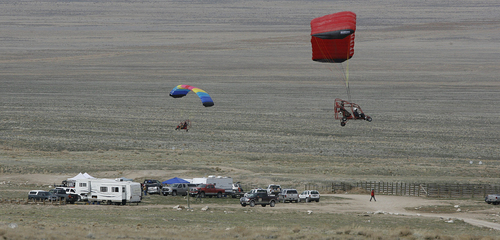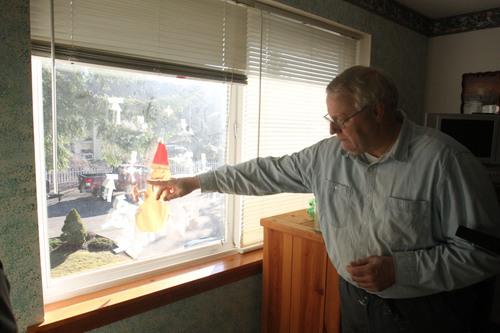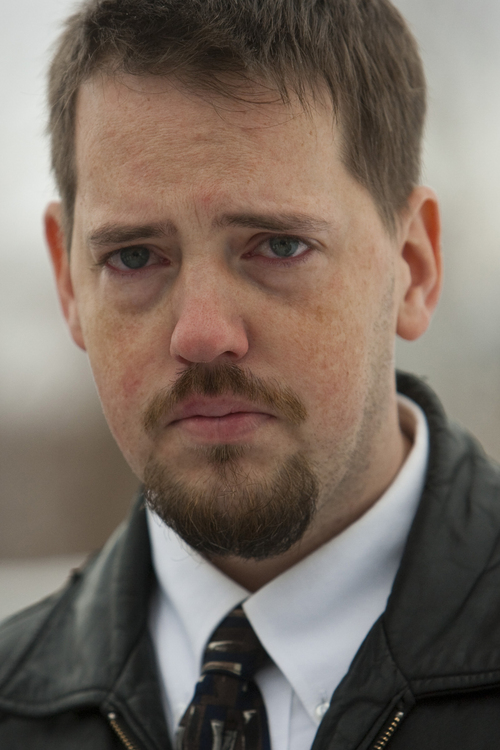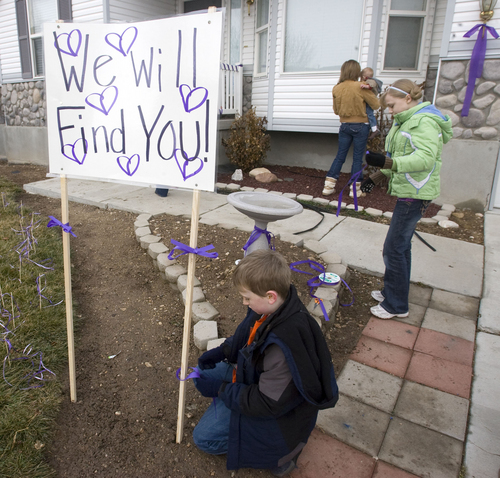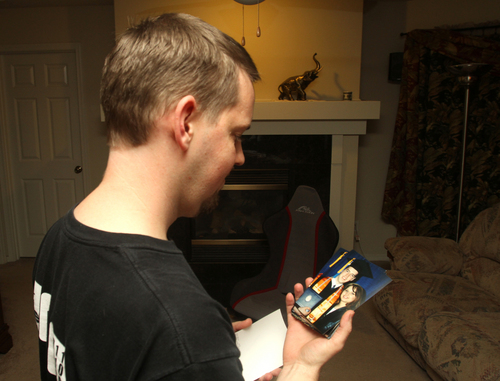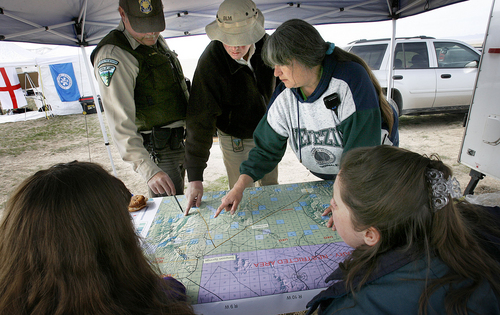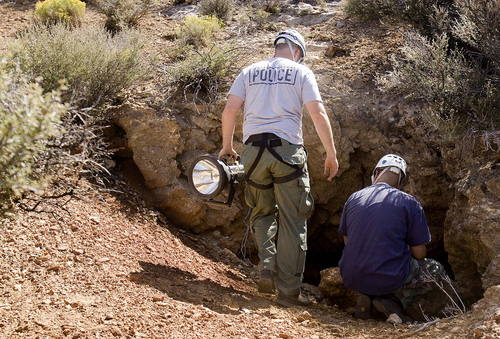This is an archived article that was published on sltrib.com in 2014, and information in the article may be outdated. It is provided only for personal research purposes and may not be reprinted.
A compelling true-crime story needs a mesmerizing character at its center, and writers Gregg Olsen and Rebecca Morris found that in Susan Cox Powell and her 2009 disappearance.
"She is so relatable in every way," Olsen says of Powell, talking in present tense about the missing woman at the center of his latest book, "If I Can't Have You," to be released Tuesday. "She's trying to hang onto her marriage, trying to raise her sons and really not knowing what she's up against. People see Susan's picture on TV, they look at her and say: 'That's my mom,' 'That's my sister' or 'That's the neighbor next door.' "
Olsen, a best-selling author, writes nonfiction true-crime books as well as crime novels. He first collaborated with Morris on 2013's "Bodies of Evidence," focusing on the Pacific Northwest's most notorious criminals.
"I know I didn't know her," says Morris about Powell, "but after spending three years writing about her, of course I feel I have come to know her.
"I think she was the kind of person who everybody thought was their best friend," added Morris, a longtime journalist turned author.
Through the reporting of the book, people who did know Susan Powell, including her closest friend from West Valley City, Kiirsi Hellewell, and her father, Chuck Cox, of Puyallup, Wash., were impressed with the authors' commitment to fact-checking and accuracy.
"I look forward to this being one of the best, most comprehensive books on the subject out there," Cox says, adding that he hopes retelling his daughter's story will help other families. "We always think about her, and we continually look for her. That's where we are."
Hellewell says she hopes the book will remind readers to be alert for any evidence in her friend's disappearance. She also hopes it will inspire women who feel trapped by domestic violence to get help.
"If I Can't Have You" begins on the day Susan Powell's disappearance was discovered by friend Debbie Caldwell, who provided day care for the couple's two young sons. Susan's husband, Josh, claimed he left his wife at home the night before when he took their sons, Charlie and Braden, then 4 and 2, on a late-night winter camping trip in Utah's West Desert.
The book reveals the depth of the authors' research, with a story pieced together from extensive interviews with family and friends, personal emails, phone records, journals obtained through court orders, lab and police reports from Utah and Washington, and court-ordered psychological evaluations from a messy battle for custody of the boys after their mom's disappearance. That legal fight ended in flames with the suicide-murder of Josh Powell, Charlie, 7, and Braden, 5, on Super Bowl Sunday, Feb. 5, 2012, in Graham, Washington.
—
Hearing the voice of Susan Powell • For all the headlines devoted to the Utah mother's disappearance, what sets apart "If I Can't Have You" are Susan's words.
"Her disappearance is foiled by the fact that she's so present in the book," says April Osborn, an editor at St. Martin's Press and a 2008 Brigham Young University graduate who helped the authors with explaining the community of the Powells' West Valley City Mormon ward.
The book is dedicated to Hellewell, Caldwell and five more of Susan's closest friends, who led countless vigils and searches to keep attention on the mystery of her disappearance. One touching moment, among scores the book details, occurs shortly after Susan disappeared when Hellewell persuaded Josh Powell to let her pack her friend's clothing. She wrote a note on a piece of Braden's artwork telling Susan not to give up hope, that thousands of people were looking for her, and tucked it away in her friend's favorite, battered pair of slippers.
The book's prologue quotes a document Susan herself had secretly stashed away in a bank safe-deposit box, which even Hellewell, one of the best friends of a woman who told everybody everything, didn't know about. "If I die, it may not be an accident even if it looks like one. Take care of my boys," Susan wrote in girlish handwriting, asking that the note not be shown to her husband.
Reading her words, squirreled away some 1½ years before she disappeared, strikes a chilling chord in a true story full of them, like "a message from the afterlife," Olsen and Morris write.
Of the book's 52 chapters, 16 open with epigrams from Susan's personal emails. Altogether, Susan's efforts to improve her marriage at the same time she documented her own fears are haunting. The final chapter also quotes from that handwritten last will and testament, dated June 28, 2008. "I love my boys, I live for them," she wrote.
—
'An unbelievably complicated case' • For readers who have closely followed news accounts, there are few explosive revelations in "If I Can't Have You." What the book excels at is providing the context of what the writers describe as "an unbelievably complicated case," further complicated by not having the body of a murder victim or a crime scene.
Josh Powell came under scrutiny early because he was the last one to see his wife alive and because he didn't seem concerned about her disappearance.
But there were "deficits" against charging him, said Salt Lake County District Attorney Sim Gill when West Valley City police announced they were closing the case in May 2013. "Even if we charge him, what do we charge him with?" Gill said at the news conference, noting the circumstantial nature of the evidence.
The book from Olsen and Morris is the third, and most thorough, account exploring the Powell tragedy. It follows a chapter in the Ann Rule crime anthology, "Fatal Friends, Deadly Neighbors and Other True Cases," published in December 2012, and a self-published book, "A Light in Dark Places," by Josh Powell's sister, Jennifer Graves, and co-writer Emily Clawson, released in June 2013.
New material in Olsen and Morris' book includes speculation about psychological damage — and possible sexual abuse — the young Powell boys may have suffered in the year and a half they lived with their father at their grandfather Steve Powell's home.
Steve Powell, 64, was released from a Washington prison in March after serving a nearly two-year sentence for voyeurism; he was convicted on 14 counts of taking secret photos of two young neighbor girls.
Olsen and Morris also explicate the legacy of emotional damage inflicted on Josh Powell and his siblings in the 1990s after Steve and Terrica Powell's divorce and messy custody battle. "I think he knows a lot more than he's said," says Olsen of Steve Powell. "He is the patriarch in this dysfunctional band."
"If I Can't Have You" details Steve Powell's sexual obsession with his daughter-in-law. During the years of his son's marriage, Powell wrote thousands upon thousands of journal entries about his explicit daydreams and fantasies. "When did he sleep?" Olsen asks. "I don't think we could even imagine that level of obsession."
"If I Can't Have You" also chronicles how the lack of communication between police jurisdictions and social-welfare agencies might have led to the deaths of Charlie and Braden Powell.
"The ultimate tragedy here is that we have all these jurisdictions and nobody talking to each other, and these two little boys are dead because of it," Olsen says. "It didn't have to happen that way."
—
A haunting story • St. Martin's Press is betting the Susan Cox Powell story will have resonance that reaches far beyond her Utah neighborhood or even readers of true-crime genre books. Unusual for contemporary books in the genre, "If I Can't Have You" is being published in hardback, not paperback, with a first press run of 15,000 to 20,000 copies.
"The story is haunting," says St. Martin's executive editor Charles Spicer. "She did nothing wrong, except trust that things would work out. She was trying to make her marriage work, trying to be a good mother."
Beyond the mystery at its center, why does Susan Powell's story remain so compelling?
There's the fact that her name has a familiar ring, since she shares it with a 1981 Miss America, Gregg Olsen says. Then there are those haunting and beautiful family photos, taken by friend Amber Hardman not long before Susan's disappearance. "It looks like a gorgeous image of an American family," the writer says. "When we look past that, there was deception, there was evil-doing going on."
facebook.com/ellen.weist —
'If I Can't Have You'
Susan Powell, Her Mysterious Disappearance and the Murder of Her Children
Authors • Gregg Olsen and Rebecca Morris
About • A Trib Talk live video chat on Monday, May 19, at 12:15 p.m. at sltrib.com will feature the case and the book. Morris and The Tribune's Sheena McFarland will participate with moderator Jennifer Napier-Pearce. In addition, the book will be the focus of The Tribune's Utah Lit book club discussion Wednesday, June 25, at 7 p.m. at the Viridian Event Center, 8030 S. 1825 West, West Jordan.
Also • The authors will launch the book at a panel discussion with Susan Powell's family and family attorney Anne Bremner at the Pioneer Park Pavilion, 330 S. Meridian, Puyallup, Wash., at 7 p.m. Friday, May 30.


